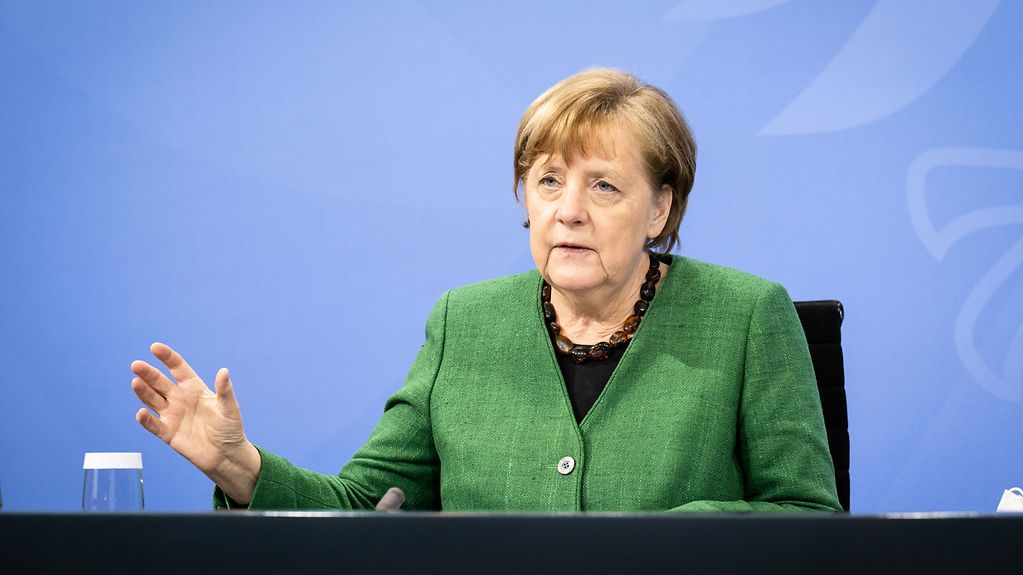Meeting of Federal Chancellor and Heads of Government of the Länder on the pandemic
The measures currently in place to contain the COVID-19 pandemic are to be extended until 18 April. It is still vital to keep contacts to a minimum because of the sharp rise in the number of new cases driven by the variant B.1.1.7. This variant now accounts for the majority of new infections in Germany. Here are the results of the meeting between the Federal Chancellor and the Heads of Government of the Länder.
4 min reading time

Chancellor Angela Merkel
Photo: Bundeskanzlerin Angela Merkel
The Federal Chancellor and the Heads of Government of the Länder have agreed to extend the measures in place to contain the COVID-19 pandemic until 18 April. That was the outcome of a video conference.
Chancellor Angela Merkel pointed out that the numbers of new cases are rising exponentially – driven in particular by the more contagious variant B.1.1.7. “We are already in the third wave. The situation is serious,” said the Chancellor. To try and engineer a peaceful period over Easter, the Thursday before Easter and Easter Saturday are to be declared quiet days with far-reaching contact restrictions. The motto for the five days over the Easter weekend is “We’re staying at home”.
Regulations to apply until 18 April
The extension of existing contact restrictions until 18 April means that private gatherings of a maximum of five people from two households are possible; children under the age of 14 do not count. In shops and public transport surgical masks or masks corresponding to standards KN95 or FFP2 must be worn. Employers must allow their staff to work from home wherever possible. No non-essential private travel or visits should be undertaken.
Emergency brake should be rigorously applied
The Federal Chancellor and the Heads of Government of the Länder were in agreement that the recently adopted “emergency brake”, which is to kick in when numbers of new infections rise, is to be applied rigorously in order to stem the spread of infections.
This means that if the seven-day incidence in any of the Länder or in any region rises above 100 for three consecutive days, it is necessary to revert to the stricter contact restrictions that applied until 7 March. Private gatherings will then once again be limited to one person from outside the household, although children under the age of 14 will not count. Any shops, museums, zoos or sports facilities that have opened will have to close again.
Additional measures are to ensure that the numbers of new infections again drop reliably. In districts with a seven-day incidence of over 100, further-reaching steps are also to be taken, including rapid antigen tests in areas where it is difficult to distance or to wear masks, and curfews or stricter contact restrictions.
The Federal Chancellor and the Heads of Government of the Länder agreed at their meeting on 3 March on possible steps to re-open when the infection situation is stable or where numbers are dropping. At the same time, they agreed what they termed an emergency brake, that would allow them to respond swiftly to higher infection rates and scale back any easing of restrictions.
Thursday before Easter and Easter Saturday to be quiet days
The Federal Chancellor and the Heads of Government of the Länder intend to use the Easter weekend as a contact breaker to end the exponential growth of the third wave with an extremely far-reaching reduction of all contacts over a period of several days. The Thursday and the Saturday of the Easter weekend, 1 April 2021 and 3 April 2021 are to be quiet days, with far-reaching contact restrictions.
Over the five consecutive days of the Easter weekend the motto is to be “We’re staying at home”. During this period, private gatherings may include only members of the same household and one other person from outside the household, up to a maximum of five people. Children under the age of 14 are not counted. Couples will be considered as one household. Gatherings will not be permitted in public spaces and hospitality with outdoor seating will be closed for the five days.
What else was decided?
The Federal Chancellor and the Heads of Government of the Länder also agreed on the following.
- No non-essential travel. People are still called on to avoid all non-essential travel, including travel over the Easter holidays.
- Across-the-board tests in schools and children’s daycare. Testing of staff in schools and children’s daycare and of school pupils will be extended. The aim is to test everyone twice a week.
- Testing in private companies. Wherever possible companies should enable their staff to work from home, as is already the case. Where this is not possible, companies should offer regular testing for staff required to work on company premises.
- Extension of visiting in nursing and care homes. Now that most residents and staff of nursing and care homes have been vaccinated, visiting can be extended provided hygiene and testing strategies are rigorously implemented.
- Pilot projects permitted. In the Länder and in individual regions pilot projects are to be possible for a limited timeframe – with strict protective measures and a testing strategy, in order to open up individual areas of public life.
The Federal Chancellor and the Heads of Government of the Länder intend to meet again to discuss the situation on 12 April.
Read the full decision taken by the Federal Chancellor and the Heads of Government of the Länder on 22 March 2021 here.
You will find the previous decision of the Federal Chancellor and the Heads of Government of the Länder dated 3 March 2021 here.